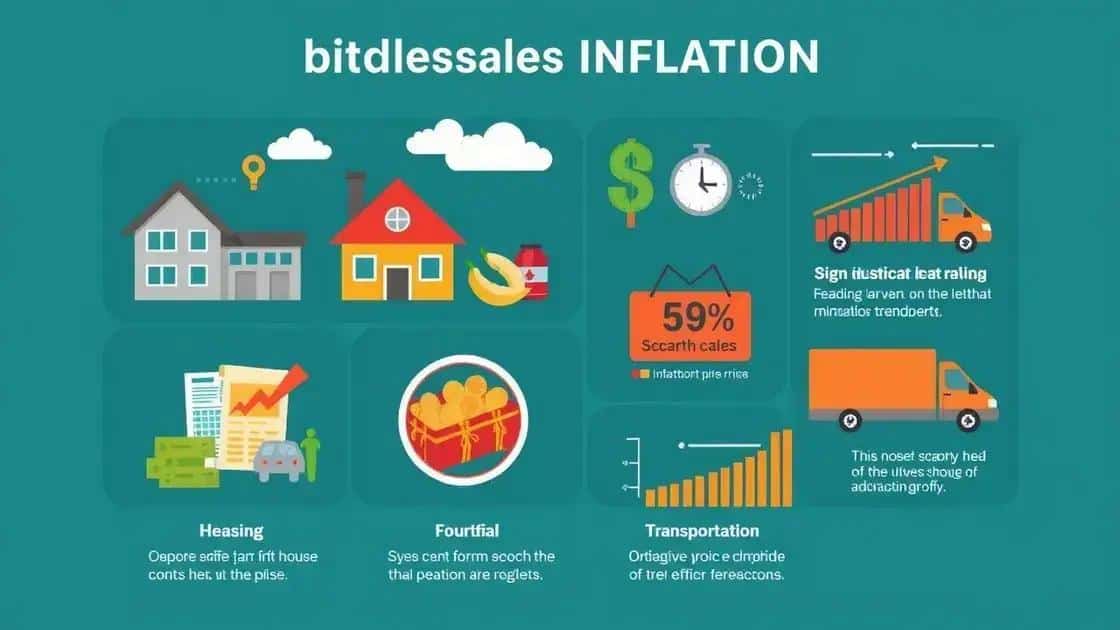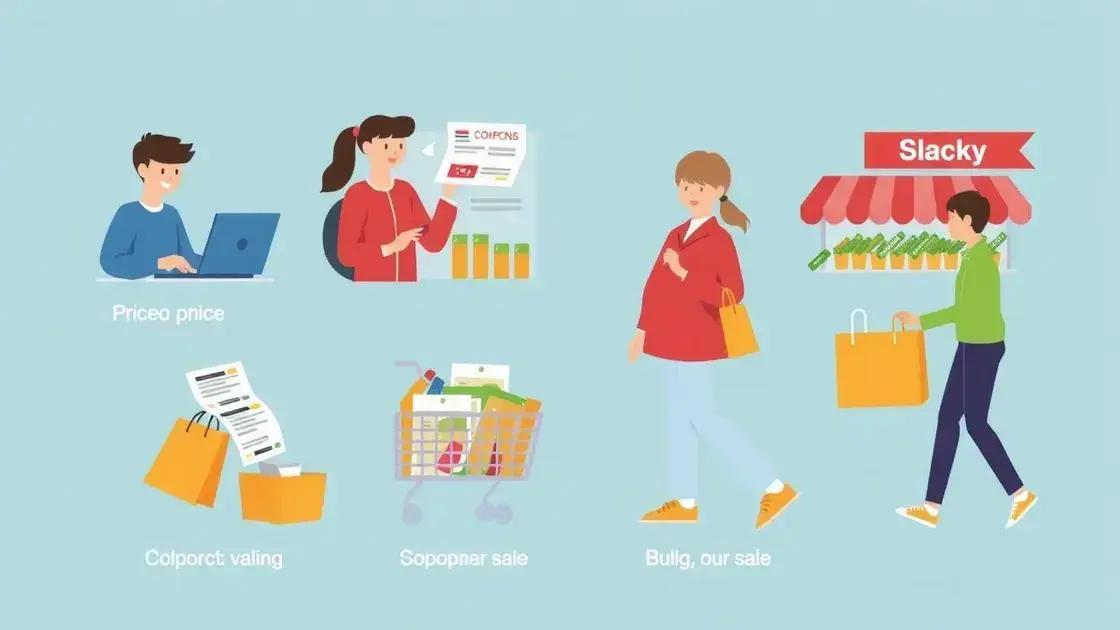Updates on global economic impact of inflation

Updates on the global economic impact of inflation show rising prices lead to cautious consumer behavior and require businesses to adapt through cost management and pricing strategies.
Updates on global economic impact of inflation are crucial as they shed light on how price increases affect everyday life and business operations. Have you noticed how your shopping bills have changed recently? Let’s explore the implications of these changes.
Understanding the current inflation trends
Understanding the current inflation trends is essential for grasping how economies respond to changing circumstances. Inflation affects everyone, from large corporations to individual consumers. By observing these trends, we can make more informed choices.
What is Inflation?
Inflation is the rate at which the general level of prices for goods and services is rising. When prices increase, purchasing power decreases. This means consumers can buy less with the same amount of money.
In the past couple of years, many countries have experienced significant inflationary pressures. This is primarily due to:
- Supply chain disruptions caused by global events
- Increased demand after pandemic-related lockdowns
- Rising production costs due to higher energy prices
Current Trends in Inflation
Recent reports indicate that inflation rates have surged across various sectors. Key factors influencing these trends include:
- Monetary policy adjustments by central banks
- Geopolitical issues affecting oil prices
- Changes in consumer behavior towards spending
Sectors like housing, food, and energy have seen noticeable price increases. For example, housing costs have risen due to higher demand and lower inventory. Food prices have also increased, influenced by supply chain bottlenecks and agricultural challenges.
As inflation persists, many consumers are adjusting their buying habits. People are more likely to seek bargains and alternative brands. They are reconsidering larger expenses like home purchases and car loans.
Investors also need to pay attention to inflation trends. Rising inflation can lead to changes in interest rates, which impact everything from loans to investments.
Key sectors affected by inflation

Key sectors affected by inflation highlight how various industries are experiencing significant changes due to rising prices. Knowing which sectors are impacted helps consumers and businesses navigate their financial decisions.
Housing Market
The housing market is one of the most noticeable sectors affected by inflation. As prices for materials rise, so do construction costs. This, in turn, increases home prices, making it harder for buyers to enter the market. Additionally, rent prices are climbing as landlords adjust to higher costs.
Currently, the housing sector faces:
- Increased property prices
- Higher rental costs
- Supply shortages in new homes
Food Industry
The food industry has also felt the impact of inflation. Rising costs for transportation, labor, and raw materials lead to higher prices for consumers. Families may find it challenging to manage their grocery budgets as certain food items become more expensive.
Key points in the food sector include:
- Increased prices for staple foods
- Higher shipping costs affecting fresh produce
- Changes in consumer buying habits, such as switching to generic brands
Transportation costs have surged due to inflation, affecting prices across multiple sectors. Fuel price increases contribute to higher shipping fees, impacting everything from furniture to electronics. As transportation costs rise, so do the prices of goods on store shelves.
Manufacturing also faces challenges. Companies are struggling with rising material costs and labor shortages. Inflation can cause delays in production, which can further drive up prices as demand outstrips supply.
Strategies for businesses to adapt to inflation
Strategies for businesses to adapt to inflation are crucial in today’s changing economic climate. As prices rise, companies must find effective ways to maintain profitability while meeting consumer needs.
Cost Management
One effective strategy is to implement stringent cost management practices. Businesses need to carefully analyze their expenses and identify areas where they can reduce costs. This might include:
- Negotiating better terms with suppliers
- Streamlining operations to eliminate waste
- Adopting technology to automate routine tasks
Pricing Strategies
Adjusting pricing strategies is another essential approach. Companies may need to raise prices to keep up with inflation. However, it’s important to do this thoughtfully. A business should communicate changes transparently to its customers to maintain trust.
Considerations for pricing adjustments include:
- Analyzing competitor pricing
- Offering tiered pricing for different customer segments
- Bundling products or services to enhance value
Additionally, businesses should focus on maintaining customer loyalty. Providing exceptional service can differentiate a company from its competitors during tough economic times. Businesses should also invest in loyalty programs to encourage repeat business.
Another strategy includes diversifying product offerings. Companies can adapt by exploring new market segments or expanding their product lines. This helps cushion the impact of inflation on any single product.
It’s also beneficial for businesses to stay informed about market trends. Understanding how inflation is affecting the industry can guide decision-making and strategy development. Regularly reviewing financial reports and market analyses can provide valuable insights.
Consumer behavior shifts due to inflation

Consumer behavior shifts due to inflation reveal how rising prices affect purchasing decisions. As incomes struggle to keep pace with inflation, people change their shopping habits.
Increasing Price Sensitivity
One common reaction is greater price sensitivity. As prices rise, consumers become more cautious with their spending. Many individuals now compare prices more carefully before making a purchase. They might switch to cheaper brands or look for discounts and sales.
Key trends include:
- Increased use of coupons and discount codes
- Preference for private label products over name brands
- Reduced spending on non-essential items
Changes in Shopping Habits
Changes in shopping habits are another aspect of this shift. Consumers may visit stores less frequently and rely more on online shopping. This allows them to easily compare prices without leaving their homes. Moreover, bulk buying is becoming more popular as shoppers aim to stock up on essentials when they are on sale.
Many consumers are also prioritizing spending on necessities over luxury items. Some consumers are eliminating small, indulgent purchases from their budgets. Instead, they focus on essential goods, including food, household items, and personal care products.
Additionally, loyalty to specific brands may decrease as shoppers explore alternatives. They are willing to try new products that offer better value for their money. Such shifts in consumer behavior encourage companies to adapt their marketing strategies accordingly. Businesses must focus on value propositions that resonate with today’s price-conscious consumers.
In conclusion, inflation significantly impacts various aspects of the economy, including consumer behavior and business strategies. As prices rise, consumers become more cautious, often opting for cheaper alternatives and reducing non-essential spending. Businesses must adapt to these changes by managing costs, adjusting pricing strategies, and focusing on customer loyalty. Understanding these shifts is key for both consumers and businesses to navigate the challenges posed by inflation.
FAQ – Frequently Asked Questions about the Economic Impact of Inflation
How does inflation affect consumer behavior?
Inflation makes consumers more price-sensitive, leading them to look for cheaper alternatives and cut back on non-essential purchases.
What should businesses do in response to inflation?
Businesses should manage costs, adjust their pricing strategies, and focus on delivering value to retain customers.
Which sectors are most impacted by inflation?
Sectors like housing, food, and transportation often experience significant price increases due to inflation.
How can consumers protect themselves from the effects of inflation?
Consumers can stay informed about prices, seek discounts, and prioritize essential purchases to manage their budgets effectively.






